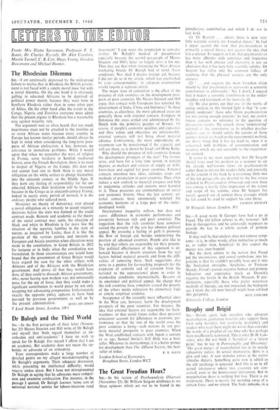The Great Freudian Hoax?
SIR,—In his review of Psychoanalysis Observed (November 25). Dr William Sargant attributes to me three opinions which are not to be found in my introductory contribution and which I do not in fact hold.
(I) 'Dr Rycroft . . . admits there is now very little scientific validity for Freudian theory.' In fact 1 argue against the view that psychoanalysis is primarily a causal theory, not against the idea that it is a science. To suggest, as I do. that psychoanalysis has more affinities with semantics and linguistics than it has with physics and chemistry is not an admission that it has very little scientific validity. Dr Sargant has fallen into the common fallacy off assuming that the physical sciences are the only sciences.
(2) . . and suggests the main Freudian claim should be that psychoanalysis represents a semantic contribution to philosophy.' No. I don't; I suggest that it makes a semantic contribution to the under- standing and treatment of the mentally ill.
(3) 'He also points out that one of the merits of
seeing analysis in this limited light is that "it com- pletely undercuts" those who blame psychoanalysis for not curing enough patients.' In fact, my contri- bution contains no reference to the question of therapeutic results. My remark about 'undercutting' referred to the controversy as to whether psycho- analysis can or should satisfy the canons of those sciences Which are based on the experimental method, my thesis being that it has no need to. since it is concerned with problems of communication and meaning which are not amenable to the experimen- tal method.
It seems to me most regrettable that Dr Sargant should have used his position as a reviewer to air his already well-known views on psychoanalysis rather than to inform his readers fully and correctly on the content of the book he is reviewing. Only two of his ten paragraphs are devoted to the five essays included in Psychoanalysis Observed and even these two convey a totally false impression of the nature and scope of the volume, since Dr Sargant has merely quoted out of context those passages which he felt could be used to support his own thesis.
CIIARLES RYCROPT 50 Wimpole Street, London, WI


































 Previous page
Previous page